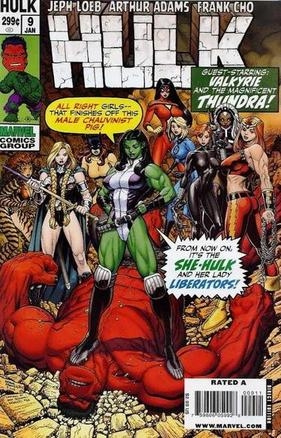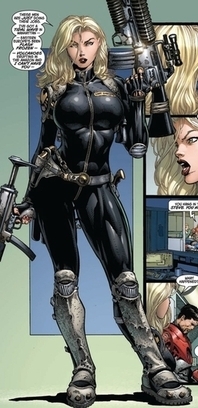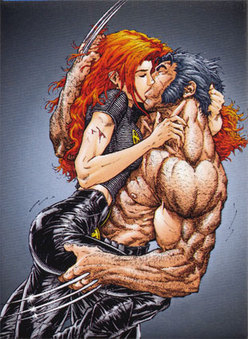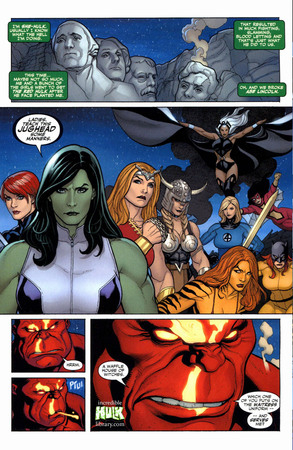Comic Books and Responsibility
By Zak Edwards
March 3, 2009 - 15:48
Something has been bothering me for quite some time now and I think this statement is the best way to set-up this article. I am bothered by some problems the comic book industry is facing and how these problems are not ones going away or even acknowledged by the majority of readers. The idea of what we, as consumers of the comic book and graphic novel medium, are supporting in terms of what is appropriate and what is inappropriate when it comes to the products we support is this problem. In a capitalist society especially, what is bought is what is made, so what is being made becomes a reflection of the society driving these products. This brings me to a serious problem within the comic book industry.
 |
| The cover being honoured here is Avengers #83 from the 1970's. |
I would also like to point out the majority of my articles are reviews of Marvel Comics’ books. Many of these I review because I enjoy them, I value escapist literature and do look to comic books as a form of entertainment, but also because they are articles that are read and numbers are very, very important, both to me and my boss. So in a way I am part of the problem, even more so than an average reader because I am giving a comic book even more exposure through writing an article on it.
But let’s look at the top sales for the month of December, the latest month on Diamond Comic Distributors website as of writing this. They are as follows:
1. Secret Invasion #8
2. Final Crisis #5
3. Secret Invasion Dark Reign
4. New Avengers #47
5. New Avengers #48
6. Batman #682
7. Batman #683
8. Hulk #9
9. Mighty Avengers #20
10. Ultimatum #2
On first glance, this looks fairly stereotypical to me. Marvel Comics enjoys the majority of the spots with seven while DC Comics makes up the remaining three. Brian Michael Bendis’ work secures four of the titles as well. Major events of the time, Final Crisis, Secret Invasion and Dark Reign, Ultimatum, Batman R.I.P, and their respective tie-ins are represented in every book save for a debatable Hulk #9. So, in a nutshell, as consumers, the comic book buying public enjoys the big events (or feels obligated to follow them) and work by well established writers like Brian Michael Bendis, Jeph Loeb, and Grant Morrison, all who have proven their abilities in past or current works despite the generally low critical reaction to the specific titles on the top ten. It is a generally accepted notion that writers have bigger followings than artists, not to say artists do not have followings as made example by works like the recent Wonderful World of Oz adaptation drawn by Skottie Young, the late Michael Turner’s extremely popular variant covers, or Frank Cho’s work in female-heavy comic books.
So let’s look at what artistic styles we are looking at for the top ten. Artists include Brian Finch, Alex Maleev, Leinil Francis Yu, Frank Cho, Billy Tan, Alex Ross, and J.G Jones, all of whom are either fairly established within the medium or very famous and all have extensive resumes within comic books, most notably with Marvel and DC Comics. All the covers, save for a possible argument for Batman #682, have the usual: impossibly exaggerated anatomies of both men and women. The DC Comics covers are less so than most of the Marvel Comics books, especially those of Hulk #9, Secret Invasion Dark Reign, and Ultimatum #2 which all have a very big focus on hyper-exaggeration of the female form especially. But sex sells, it isn’t a cliched saying, it’s the truth and everyone knows it, and I hardly need to come up with examples for that. One of the goals of this article is to question this cliche as this medium above any other has serious issue involved with the sexuality depicted. But I would like to take a closer look at a couple of titles in particular, that being Hulk #9 and Ultimatum #2. Both have received extremely negative criticism from multiple reviewers (including right here at the Bin), and both are also blatantly offensive, especially Hulk #9.
Now this may appear to be picking on Jeph Loeb, the writer of both books, but these titles epitomize the top ten, either being part of an event, written by a superstar and illustrated by a well-known artist, and both are books published by Marvel Comics, which is also a common theme amongst the majority of books. But they also tell something else about our buying habits which we should be ashamed of as a demographic and as consumers.
 |
 |
Hulk #9 is possibly the most offensive, misogynistic, and blatantly pathetic comic book I have read in a very long time and possibly ever. This may come across as melodramatic, but the issue is offensive, almost ironically so. The cover, a throwback to an Avengers issue from the seventies, depicts a victorious She-Hulk standing on top of an unconscious Red Hulk and surrounded by about eight female super heroes. The speech bubble coming from She-Hulk declares “All Right Girls-- That Takes Care of That Male Chauvinist Pig!” Of course, the Red Hulk does happen to be fairly chauvinistic in this issue and is the villain, so this works. Unfortunately, both of the major creators happen to be quite misogynistic themselves, and the cover then only serves to point out the self-perpetuation of outdated and now offensive ideals. Let’s start with the artist of the story, Frank Cho. Cho belongs to a long line of comic book illustrators who literally make a
 |
| This picture does not fully exemplify what I am trying to discuss, but it was the only interior art I could find. Take note of Red Hulk's wonderful scripting! |
As for the writing of Hulk #9, Jeph Loeb proves the cover of this book as not satirical, but perpetuating a sexist message. The female characters do overcome the Red Hulk initially, only to discover he was faking in order to grab hold of one of them after the fight. The inner monologue of the She-Hulk during the fight contains such cliched lines like, “You think it’s hard being a superhero, try doing it as a woman,” which only undermines the feminist movement and thinking by relying on these overtly old and tired arguments. The statement reduces much of what She-Hulk is saying to cliche, which in turn moves her argument from legitimate to mockery and through this mockery, a joke. But after the fight is over, the story continues along these lines. Immediately after the characters think they have defeated their adversary, mindless idle chatter begins. Two characters begin gossiping about Tony Stark and who hasn’t slept with him, another begins complaining about jokes made towards them. Only the most masculine looking characters, the She-Hulk and Thundara, actually try to come to some sort of conclusion on what to do with Red Hulk. This in itself causes problems, suggesting female characters have to adopt male characteristics in order to be in control of a situation. The irony is, even when they are attempting to be in control, the male character playing possum and wrapped up in chains is still in ultimate control of the situation. I have heard the argument for satire, but the satire present here, if it is intended to be as such, is lost because of a lack of argument. For satire to work, there has to be a condemnation, a call of attention to something wrong and, however covered up, a call for change and action. By selecting artists who perpetuate the objectification of the female body while infusing it with blatantly anti-feminist writing, Hulk #9 is not satirical, it is a throwback and nostalgic look at a time where this sort of writing was acceptable. Now, this writing is offensive and disregarding some major social developments in the world. I other words, Loeb is expressing a want for a world we should be looking back at as restricting and backwards, but instead he is upholding these outdated values. Overall, the story is not only offensive, but proves to be misogynistic and thus making the cover not only deeply ironic, but depicts the comic book industry, the popular ones especially, as stunted and flattened works of pulp fiction not deserving any serious study.
This article is hardly original. The condemnation of the art in popular comic books is something which has been studied by much smarter and more accomplished people than I. The problems presented in the top ten comics are also hardly exclusive to comic books either. Certainly many of these arguments could be translated over to magazines, films, television or certainly any other form of popular culture medium. But I also believe comic books are at a crucial step in their development as a medium. More and more comic books are showing up on university book lists, getting more attention in more legitimate mediums, but at the same time garnering a continued public perception of largely being, as Scott McCloud put it, “semiliterate, cheap, disposable kiddie fare.” Are super hero comics really that different from most thirty years ago, even after the impact of books like Watchmen? If one is to look at the best selling comic books, the industry is stagnate, offensive, and certainly not innovative. So I am questioning what we, as consumers and supporters of the comic book industry, are buying. I am certainly not telling you what to buy, I know the value some escapism can have and do encourage comic books which allow for this, but I am asking you to think about what you support with your money. I, for one, am stating a pact with myself to not buy books with contributions by the artistic team behind Hulk #9 from now on because I do not believe this sort of text should be encouraged. Of course, I do have to finish my reviews of the Ultimatum, as promised, but following this, I am making a personal choice not to support these artists on grounds of offensive material. I encourage you to do the same.
Related Articles:
So Superman Is Bisexual?
Emerald City Comicon Gets ‘Sexy’
How to Write Lesbian, Gay, Bisexual and Transgender Issues: A Guide
Fantagraphics Bookstore to Have a "Sexytime"
Nightcrawler and the Demonization of Homosexuality
Sex, Comic Books, and Censorship: An Irresistible Menage a Trois?
Mystique: Crossing the Boundaries of Sex, Gender and Human Nature
Yay for the Jim Henson Company! Suck it Chik-Fil-A (as long as "it" is of the opposite sex)!
Image Comics Presents Sexy New Sci-Fi Series "Vescell"
Mondo Urbano: A Story of Sex, Drugs and Rock ‘n’ Roll (Vol. 1)
